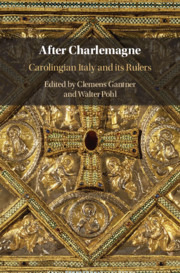Description
After Charlemagne
Carolingian Italy and its Rulers
Coordinators: Gantner Clemens, Pohl Walter
Offers new perspectives on the fascinating but neglected history of ninth-century Italy and the impact of Carolingian culture.
Language: English
Subject for After Charlemagne:
Publication date: 12-2020
350 p. · 16x23.5 cm · Hardback
350 p. · 16x23.5 cm · Hardback
Description
/li>Contents
/li>Biography
/li>
After Charlemagne's death in 814, Italy was ruled by a succession of kings and emperors, all of whom could claim some relation to the Carolingians, some via the female line of succession. This study offers new perspectives on the fascinating but neglected period of Italy in the ninth century and the impact of Carolingian culture. Bringing together some of the foremost scholars on early medieval Italy, After Charlemagne offers the first comprehensive overview of the period, and also presents new research on Italian politics, culture, society and economy, from the death of Charlemagne to the assassination of Berengar I in 924. Revealing Italy as a multifaceted peninsula, the authors address the governance and expansion of Carolingian Italy, examining relations with the other Carolingian kingdoms, as well as those with the Italian South, the Papacy and the Byzantine Empire. Exploring topics on a regional and local level as well as presenting a 'big picture' of the Italian or Lombard kingdom, this volume provides new and exciting answers to the central question: How Carolingian was 'Carolingian Italy'?
1. Italy after Charlemagne: scope and aims of the volume Clemens Gantner and Walter Pohl; 2. A brief introduction to Italian political history until 875 Clemens Gantner; Part I. Was There a Carolingian Italy?: 3. Talking about the Carolingians in eighth- and ninth-century Italy Thomas F. X. Noble; 4. The name of the kingdom Paolo Delogu; 5. Was there a Carolingian Italy? Politics, institutions and book culture François Bougard; Part II. Organizing Italy: 6. The government of a peripheral area: the Carolingians and north-eastern Italy Stefano Gasparri; 7. Vassals without feudalism in Carolingian Italy Giuseppe Albertoni; 8. Shaping a kingdom: the sees of Parma and Arezzo between the reigns of Louis II and Berengar Igor Santos Salazar; Part III. Carolingian Rulers: 9. Staying Lombard while becoming Carolingian? Italy under King Pippin Marco Stoffella; 10. Carolingian fathers and sons in Italy: Lothar I and Louis II's successful partnership Elina Screen; 11. A king in training? Louis II of Italy and his expedition to Rome in 844 Clemens Gantner; Part IV. Cities, Courts and Carolingians: 12. A Byzantine cuckoo in the Frankish nest? The Exarchate of Ravenna and the Kingdom of Italy in the long ninth century Tom Brown; 13. Urbanism as politics in ninth-century Italy Caroline Goodson; 14. Rome and the others: saints, relics and hagiography in Carolingian north-eastern Italy Francesco Veronese; 15. Between the palace, the school and the forum: rhetoric and court culture in late Lombard and Carolingian Italy Giorgia Vocino; Bibliography.
Clemens Gantner is Researcher at the Department for Historical Identity Research at the Institute for Medieval Research, Austrian Academy of Sciences, where his research is focussed on early medieval Italy and intra- and intercultural communication around the Mediterranean. He is the author of Freunde Roms und Völker der Finsternis (2014), editor of The Resources of the Past in Early Medieval Europe (2015) and is preparing a monograph on Louis II, great-grandson of Charlemagne and emperor in Italy in the ninth century.
Walter Pohl is Professor of History at the Institute for Austrian Historical Research, University of Vienna and Director of the Institute for Medieval Research, Austrian Academy of Sciences. His research addresses many aspects of early medieval history, with a special interest in Italy. His publications include The Avars: A Steppe Empire in Central Europe, 567–822 (2018), Strategies of Identification: Ethnicity and Religion in Early Medieval Europe, ed. Walter Pohl and Gerda Heydemann (2013) and over 200 journal articles. In 2004 he was awarded the Wittgenstein Prize, and he has been a recipient of an ERC Advanced Grant (2010) and a Synergy Grant (2019).
Walter Pohl is Professor of History at the Institute for Austrian Historical Research, University of Vienna and Director of the Institute for Medieval Research, Austrian Academy of Sciences. His research addresses many aspects of early medieval history, with a special interest in Italy. His publications include The Avars: A Steppe Empire in Central Europe, 567–822 (2018), Strategies of Identification: Ethnicity and Religion in Early Medieval Europe, ed. Walter Pohl and Gerda Heydemann (2013) and over 200 journal articles. In 2004 he was awarded the Wittgenstein Prize, and he has been a recipient of an ERC Advanced Grant (2010) and a Synergy Grant (2019).
© 2024 LAVOISIER S.A.S.




